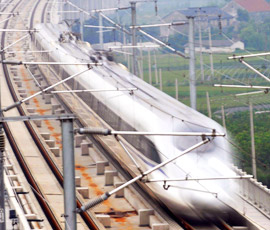Farmers affected by HS2 must get ‘fair deal’

Farmers who are indirectly affected by the proposed High Speed Rail (HS2) link must be given a “fair deal”, the NFU has insisted.
Planning minister Greg Clark unveiled the new National Planning Policy Framework (NPPF) which has been cut from more than 1,000 to 50 pages to reduce red tape, on Tuesday (27 March).
Ahead of the publication of the document, green campaigners, including the Friends of the Earth, said they were concerned that the new guidelines would unleash a building “free for all” for developers, leading to urban sprawl.
For example, recent reports have suggested that the policy could lead to 100,000 homes being built on green belt land near the new high-speed line to Birmingham.
The NFU reacted to the publication of the NPPF by insisting that the government gives farmers affected by the HS2 route a fair deal.
NFU planning policy adviser Ivan Moss said: “There must be a fair deal for the people affected by the HS2 route.
“Where is the fairness in land and property prices going down without adequate compensation measures? We urge the government to act accordingly to ensure fair compensation is agreed.”
At present, if the value of a property is affected by HS2 but not actually built on, the government will only buy it in exceptional circumstances.
In addition, there is a waiting period of a year after the line opens to assess whether there has been any long-term loss in the value of the property for which compensation will be paid.
But the NFU is pushing for an alternative bond-based scheme that would mean property owners could apply for a bond to guarantee the value of the house and that the government would purchase it if required. The bond would be tied to the property underpinning its value, to give confidence to both lenders and future purchasers that there will be a buyer for the property in the future.
Mr Clark said the new framework offers “five guiding principles” of sustainable development. These included: living within the planet’s means; ensuring a strong, healthy and just society; achieving a sustainable economy; promoting good governance and using sound science responsibly.
He said the reforms established a “presumption in favour of sustainable development”, which is necessary to boost jobs and economic growth. But he added that the framework would guarantee “robust protections” for the countryside.
The NPPF also includes a return to “brownfield first”, requiring councils to favour previously used land for new development over green belt land.
Under the reforms, locals communities will also be able to specify where renewable energy resources, such as wind turbines can or cannot be located.
The Country Land and Business Association said the NPPF was a “boost” for planning in rural areas. CLA president Harry Cotterell said the new planning guidelines would kickstart rural innovation.
He added that the NPPF’s “presumption in favour of sustainable development” will give a fillip to rural businesses, allowing planning applications to proceed more quickly in many areas where the local auhtority has failed to produce an up-to-date plan.
The Campaign to Protect the Rural Environment (CPRE) also welcomed the new planning reforms. However, its chief executive Shaun Spiers said the CPRE remained concerned that the new plans did not place too much emphasis on short-term economic growth at the expense of “other important long term, public interest objectives of planning, including the protection and enhancement of the environment”.
Barney White-Spunner, executive chairman of the Countryside Alliance, said: “The planning minister, Greg Clark, said that the new NPPF would provide for ‘a local plan produced by local people’, but we remain concerned that there is still a lack of clear guidance for a local community if it has legitimate concerns about a new development.”
